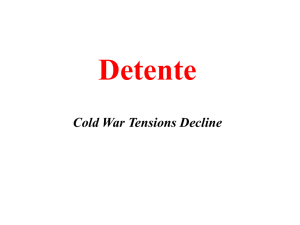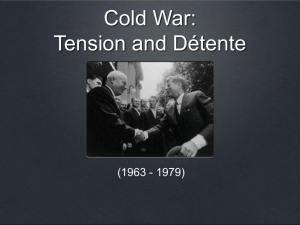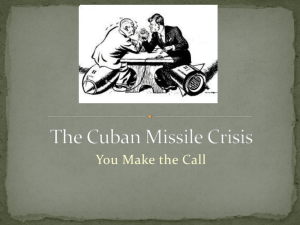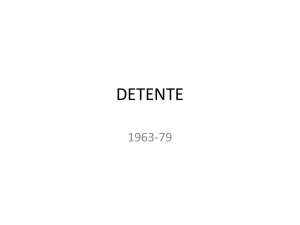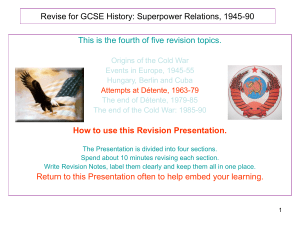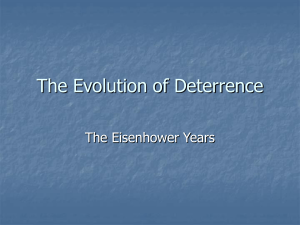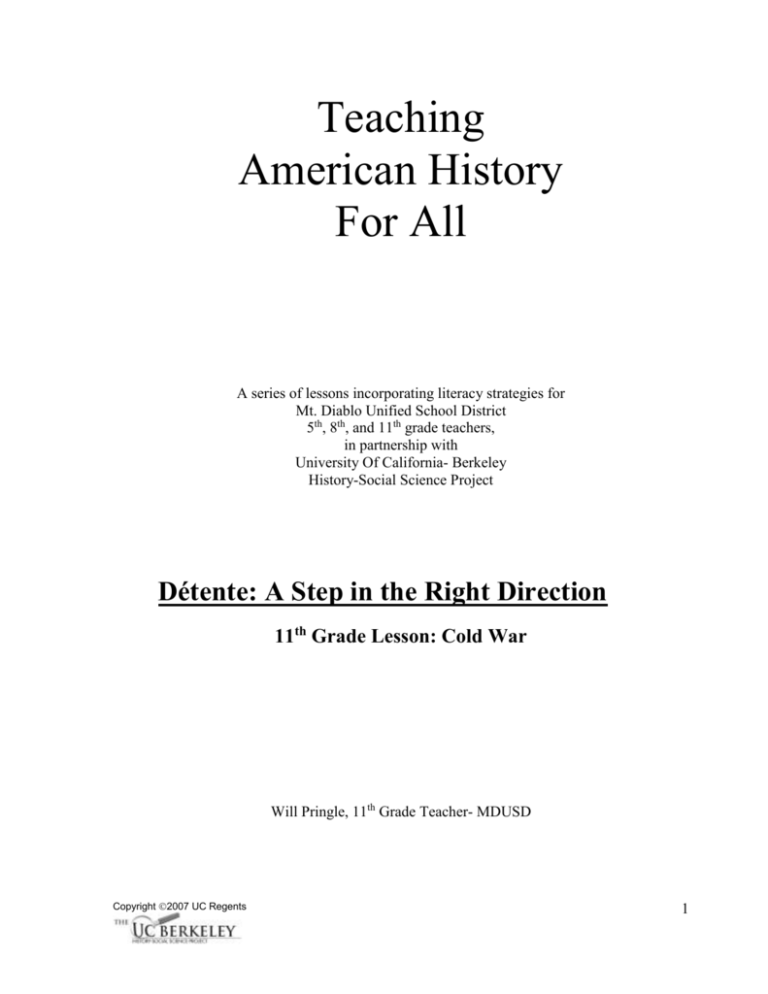
Teaching
American History
For All
A series of lessons incorporating literacy strategies for
Mt. Diablo Unified School District
5th, 8th, and 11th grade teachers,
in partnership with
University Of California- Berkeley
History-Social Science Project
Détente: A Step in the Right Direction
11th Grade Lesson: Cold War
Will Pringle, 11th Grade Teacher- MDUSD
Copyright 2007 UC Regents
1
Teaching American History for All
MDUSD/UCBH-SSP 11th Grade
Will Pringle, Teacher (Clayton Valley H.S./MDUSD)
Grant Focus Question:
How did definitions of citizenship change from the seventeenth century to the twentieth
century?
Yearlong Focus Question:
How have the powers of the United States federal government expanded or been limited since
the Civil War?
Unit Focus Question:
How did the Cold War affect U.S. domestic policy?
Unit Working Thesis: The Cold War had a number of effects on U.S. domestic policy, including an
increase in military spending and the growth of military spending as a proportion of the government
budget, increased attention to science and education, and restrictions of civil liberties. Although it is
important to see the role of the federal government..
Reading Strategy Lessons:
Sentence-Level: Deconstruction, pp. 3-4 (key on pp. 8-9) [correlates with CH 15.1, pp. 504]
Passage Level: Cause/Effect, pp.5 (key on pp.10)[correlates with CH 15.1, 503-504, 507]
Writing Strategy Lessons:
Evidence Practice, p. 6 (key on p. 11) [correlates with CH 15.1, pp504]
Analysis Practice, p. 7 (key on p. 12) [correlates with CH 15.1, pp504]
Writing Prompt:
How did the Cuban Missile Crisis influence the United States policy of detente? p. 18
Context of the lesson in the unit:
Use unit lessons after World War II. This Cold War unit will consist of different activities to be
conducted throughout the unit.
Suggested Amount of Time: Three to four block-period classes for the Cold War unit, specifically one
class period for the era of detente.
Textbook:
Esler, Anthony; Gaynor Ellis, Elisabeth. World History: The Modern World. Boston,
Massachusetts: Pearson Prentice Hall., 2007, pp. 502-542.
Copyright 2007 UC Regents
2
History-Social Science Content Standards:
11.9.3 Students analyze United States foreign policy since World War II, in terms of the origins
and geopolitical consequences (foreign and domestic) of the Cold War and containment policy,
including:
the era of McCarthyism, instances of domestic Communism (e.g., Alger Hiss) and
blacklisting
the Truman Doctrine
the Berlin Blockade
the Korean War
the Bay of Pigs invasion and the Cuban Missile Crisis
atomic testing in the American west, “mutual assured destruction” doctrine,
disarmament policies
the Vietnam War
Latin American policy and the economic relationships today
Historical and Social Sciences Analysis Skills:
Historical Research, Evidence, and Point of View
4. Students construct and test hypotheses; collect, evaluate, and employ information from
multiple primary and secondary sources; and apply it in oral and written presentations.
Reading/Language Arts Content Standards:
Reading: 2.0 Reading Comprehension (Focus on Informational Materials)
2.4
2.5
Make warranted and reasonable assertions about the author’s arguments by using
elements of the text to defend and clarify interpretations.
Analyze an author’s implicit and explicit philosophical assumptions and beliefs about a
subject.
Writing: 1.0 Writing Strategies
1.3
Structure ideas and arguments in a sustained, persuasive, and sophisticated way and
support them with precise and relevant examples.
Writing: 2.0 Writing Applications (Genres and Their Characteristics)
2.4
Write historical investigative reports:
a. Use exposition, narration, description, argumentation, or some combination or
rhetorical strategies to support the main proposition.
Copyright 2007 UC Regents
3
Sentence-Level Deconstruction
Part 1Directions: Read the following passage and circle the verbs/verb phrases. Read the comprehension question,
but do not write your answer yet. Then, fill out the chart on the following page. Once you have completed the chart,
go back to the comprehension question and answer it in complete sentences.
American and Soviet arms control agreements led to an era of détente, or relaxation of tensions, during the
1970s. The American strategy under détente was to restrain the Soviet Union through diplomatic agreements
rather than by military means. The era of détente ended in 1979, when the Soviet Union invaded Afghanistan.
— World History: The Modern World, Pearson Prentice Hall, Chapter 15, The Cold War p. 504.
Comprehension Question: Why did the United States government adopt a policy of détente during the 1970s?
Copyright 2007 UC Regents
4
Part 2 Directions: Using the passage in Part 1, fill out the participant column and other columns as needed. As a class, complete the
conclusions/questions column. After class discussion, answer the comprehension question.
Time
Participant(s): Subject
Process:
Message: Who, What, Where Questions and Conclusions:
markers/
Verb/verb
What conclusion/s can you draw?
connectors
phrases
What questions do you have?
During the
1970s
led to
The American strategy
under détente
the Soviet Union through
diplomatic agreements rather
than military means
in 1979
when the Soviet Union invaded
Afghanistan
— World History: The Modern World, Pearson Prentice Hall, Chapter 15, The Cold War p. 504.
Comprehension Question: Why did the United States government adopt a policy of détente during the 1970s?
Copyright 2007 UC Regents
5
Cause and Effect
Cause and Effect
Cause
Effect
[Because] events such as the
Cuban Missile Crisis brought the
United States to the brink of
nuclear war
They (ABMs) were seen as a
threat to the balance of power
[Because] of this perceived
threat to the balance of power
The era of détente ended
— World History: The Modern World, Pearson Prentice Hall, Chapter 15, The Cold War p. 504.
Content Question: Why did the United States government adopt a policy
of détente during the 1970s?
Copyright 2007 UC Regents
6
Evidence Practice
Directions: Read the thesis statement below and circle the evidence which
best supports it.
Essay Question:
Thesis:
Why did the United States government adopt a policy of détente
in the 1970s?
The 1970s era of détente in the United States, was influenced by the
nuclear arms development and nearly tragic consequences of the
1960s, triggered by the Cuban Missile Crisis.
Evidence Choices:
1.
The 1963 Nuclear Test Ban Treaty banned testing of nuclear weapons in
the atmosphere.
2.
President Eisenhower warned against the Military Industrial Complex in his
farewell address before leaving office.
The escalation of the Vietnam War put a serious strain on the United States
military.
The 1972 SALT I Anti-Ballistic Missile Treaty set strict limits on missiles that
could shoot down missiles from the other side.
President Nixon faced strong criticism for his attempts to create relations with
China.
3.
4.
5.
Copyright 2007 UC Regents
7
Analysis Practice
Analysis is the explanation that clarifies for the reader why the evidence cited is relevant and
how it supports and proves the topic sentence of the paragraph. These sentences answer the
question: “Why is this significant?”
Essay Question: After the Cuban Missile Crisis why did the United States select the
1970s policy of détente in the Cold War between the United States and Soviet Union?
Example: In the example below, notice how the analysis sentence provides the “so
what?” for the evidence and helps to prove the topic sentence.
(TS): The United States government adopted a policy of détente during the 1970s in
response to the nearly tragic nuclear confrontations of the 1960s.
(EV): In 1972, the SALT I Interim Agreement froze existing number of weapons held by
each side.
(EV): In 1972, the SALT I Anti-Ballistic Missile Treaty set strict limits on missiles that
could shoot down missiles from the other side.
(AN): This is important because while this policy did not end the Cold War, it was able to at
least bring the two nations together in an attempt to set limits on nuclear proliferation .
____________________________
Practice: Using the topic sentence above, fill in the two blank below.
(EV): The 1963 Nuclear Test Ban Treaty banned testing of nuclear weapons in the
atmosphere.
(EV): ABMs were seen as a threat to the balance of power because they might encourage
the protected side to attack.
(AN): This shows that
Copyright 2007 UC Regents
8
Teacher Key: Sentence-Level Deconstruction
Directions: Read the following passage and circle the verbs. Read the comprehension question, but do not write your
answer yet. Then, fill out the chart on the following page. Once you have completed the chart, go back to the
comprehension question and answer it in complete sentences.
American and Soviet arms control agreements led to an era of détente, or relaxation of tensions, during the
1970s. The American strategy under détente was to restrain the Soviet Union through diplomatic agreements
rather than by military means. The era of détente ended in 1979, when the Soviet Union invaded Afghanistan.
— World History: The Modern World, Pearson Prentice Hall, Chapter 15, The Cold War p. 504.
Copyright 2007 UC Regents
9
Teacher Key for Sentence Deconstruction Teachers discuss language issues, conclusions, and questions with the class.
Time
markers/
connectors
During the
1970s
Participant(s): Subject
American and Soviet arms
control agreements
The American strategy under
détente
in 1979
Process:
Verb/verb
phrases
led to
was to
restrain
Message: Who, What, Where
an era of détente, or relaxation of
tensions
the Soviet Union through
diplomatic agreements rather than
military means
The era of detente
ended
when the Soviet Union invaded
Afghanistan
Questions and Conclusions:
What conclusion/s can you draw? What
questions do you have?
Both nations understood the necessity of
avoiding a nuclear war
What are examples of these diplomatic
agreements: SALT I and SALT II treaties
What was the U.S. response to the Soviet
invasion of Afghanistan: Reagan
Administration develops defense programs
such as SDI during the 1980s
— World History: The Modern World, Pearson Prentice Hall, Chapter 15, The Cold War p. 504.
Comprehension Question: Why did the United States government adopt a policy of détente during the 1970s
Comprehension Question:
Sample Answer: During the 1970s the United States government adopted a policy of détente as a response to the escalation of the threat of
nuclear war. Incidents like the Cuban Missile Crisis clearly demonstrated the need for both nations to attempt to come to an agreement about
the issue of nuclear weapons. Détente, or a relaxation of tensions, focused on creating such agreements between the United States and the
Soviet Union. These agreements focused on such issues as freezing the number of weapons held by each side and setting limits on missiles that
could shoot down missiles from the other side (ABMs.)
Copyright 2007 UC Regents
10
Teacher Key For Cause and Effect
Cause and Effect
Cause
[Because] events such as the
Cuban Missile Crisis brought the
United States to the brink of
nuclear war
Effect
The United States and Soviet
Union met at disarmament
(removal of weapons) talks in the
hope keeping each other from
launching nuclear weapons
[Because]anti-ballistic missiles
(ABMs) would potentially give
one nation some protection
against the other
They (ABMs) were seen as a
threat to the balance of power
[Because] of this perceived threat
to the balance of power
The SALT I Anti-Ballistic Missile
Treaty set strict limits on the
number of ABMs.
[Because]the Soviet Union
invaded Afghanistan in 1979
The era of détente ended
— World History: The Modern World, Pearson Prentice Hall, Chapter 15, The Cold War p. 504.
Copyright 2007 UC Regents
11
Evidence Practice Key
Directions: Read the thesis statement below and circle the evidence which
best supports it.
Essay Question:
Thesis:
Why did the United States government adopt a policy of détente
in the 1970s?
The 1970s era of détente in the United States, was influenced by the
nuclear arms development and nearly tragic consequences of the
1960s, triggered by the Cuban Missile Crisis.
Evidence Choices: (*** = correct answers)
1. ***The 1963 Nuclear Test Ban Treaty banned testing of nuclear weapons in
the atmosphere.
2. President Eisenhower warned against the Military Industrial Complex in his
farewell address before leaving office.
3. The escalation of the Vietnam War put a serious strain on the United States military.
4. *** The 1972 SALT I Anti-Ballistic Missile Treaty set strict limits on missiles that
could shoot down missiles from the other side.
5. President Nixon faced strong criticism for his attempts to create relations with
China.
Key For Analysis Practice
Copyright 2007 UC Regents
12
Analysis is the explanation that clarifies for the reader why the evidence cited is relevant and
how it supports and proves the topic sentence of the paragraph. These sentences answer the
question: “Why is this significant?”
Essay Question: Why was the 1970s era of détente a logical progression in the Cold
War between the United States and Soviet Union?
Example: In the example below, notice how the analysis sentence provides the “so
what?” for the evidence and helps to prove the topic sentence.
(TS): The United States government adopted a policy of détente during the 1970s in
response to the nearly tragic nuclear confrontations of the 1960s.
(EV): In 1972, the SALT I Interim Agreement froze existing number of weapons held by
each side.
(EV): In 1972, the SALT I Anti-Ballistic Missile Treaty set strict limits on missiles that
could shoot down missiles from the other side.
(AN): This is important because while this policy did not end the Cold War, it was able to at
least bring the two nations together in an attempt to set limits on nuclear proliferation .
____________________________
Practice: Using the topic sentence above, fill in the blank below.
(EV): The 1963 Nuclear Test Ban Treaty banned testing of nuclear weapons in the
atmosphere.
(EV): ABMs were seen as a threat to the balance of power because they might encourage
the protected side to attack.
(AN): This shows that
Copyright 2007 UC Regents
specific actions were taken to help prevent a nuclear confrontation
13

